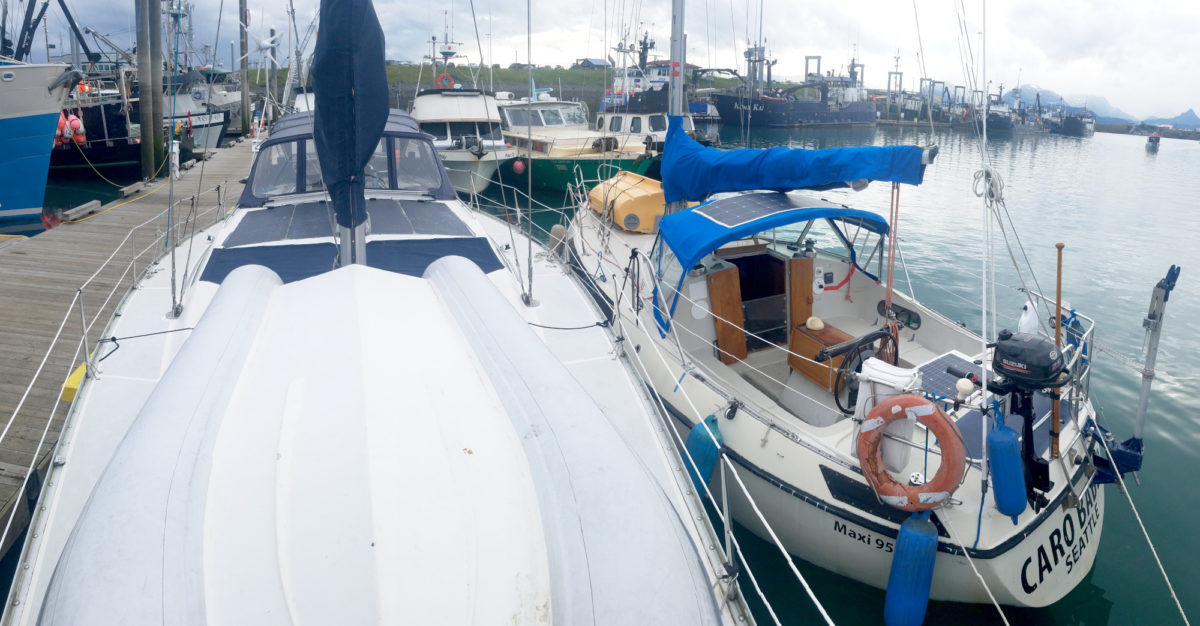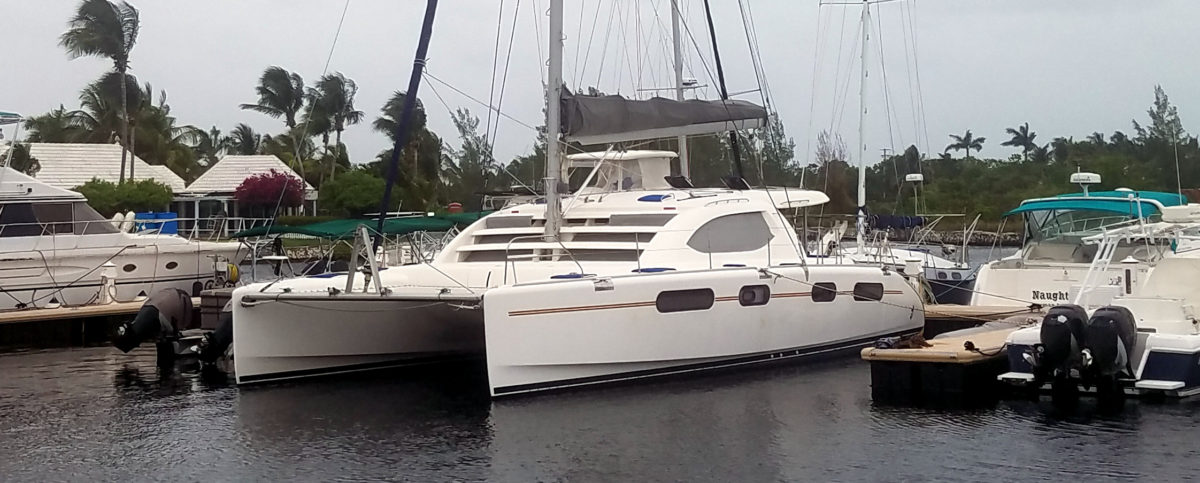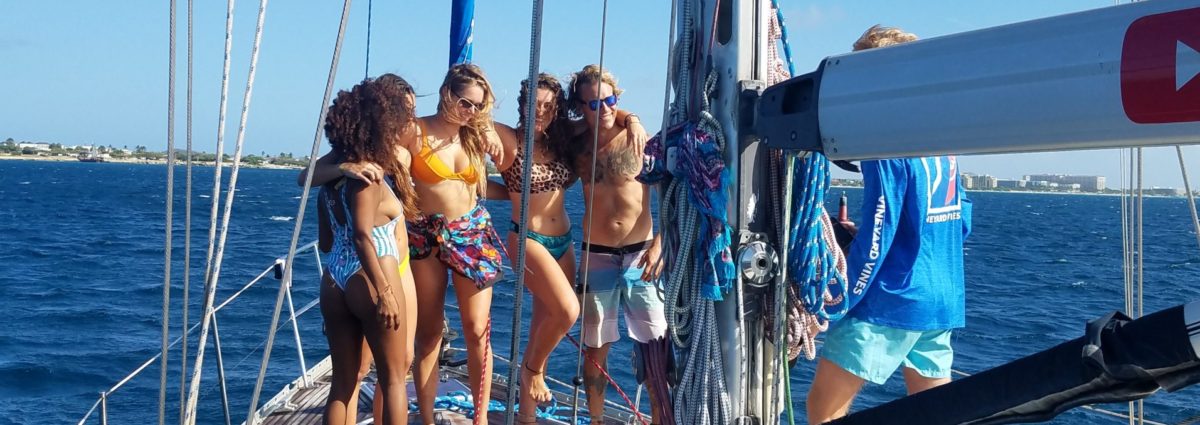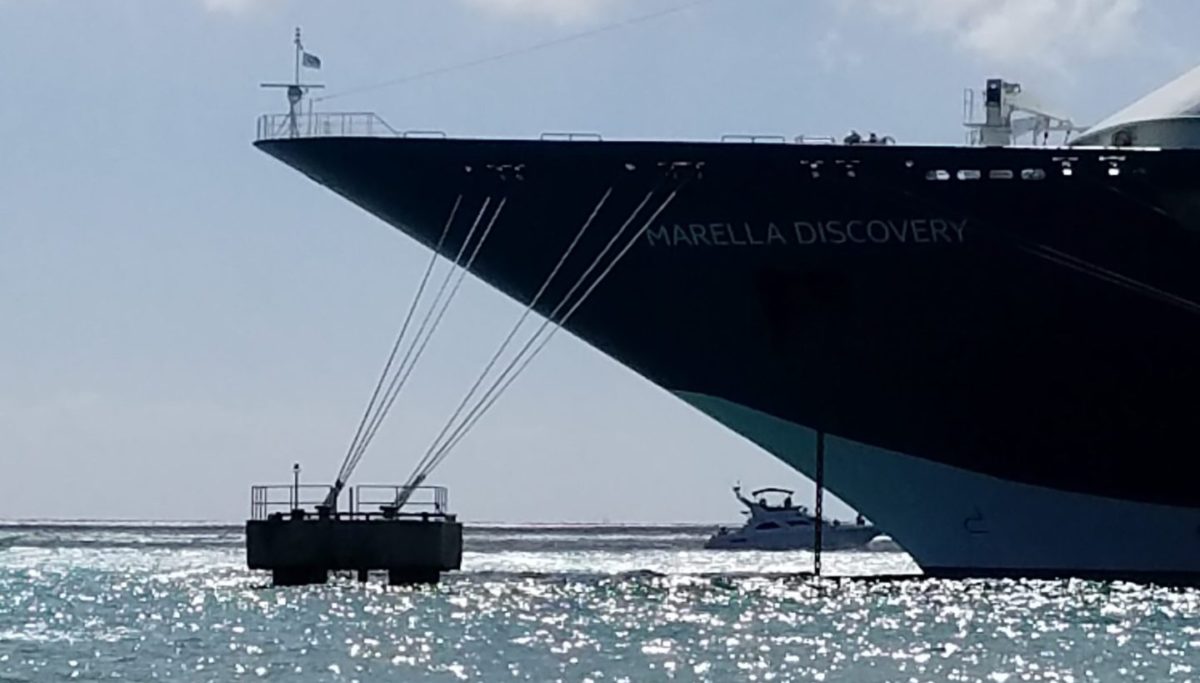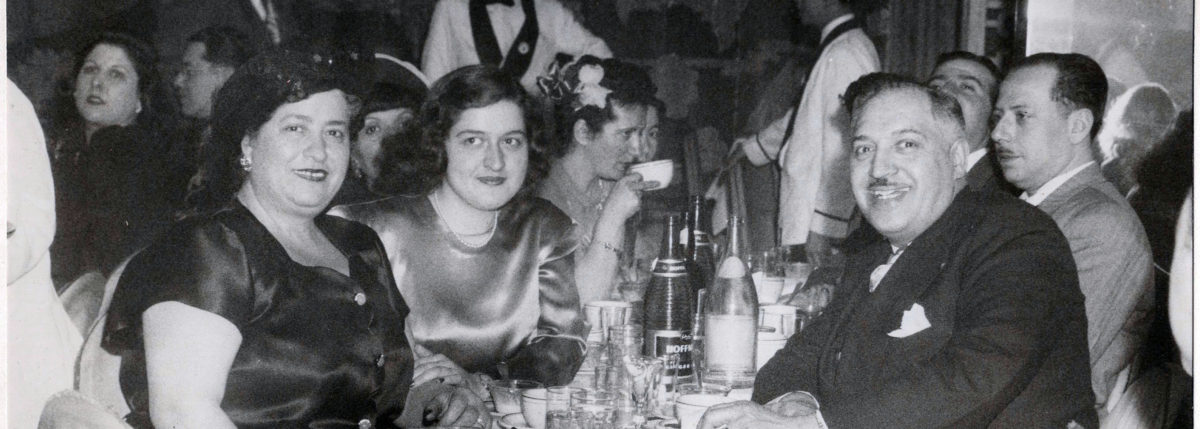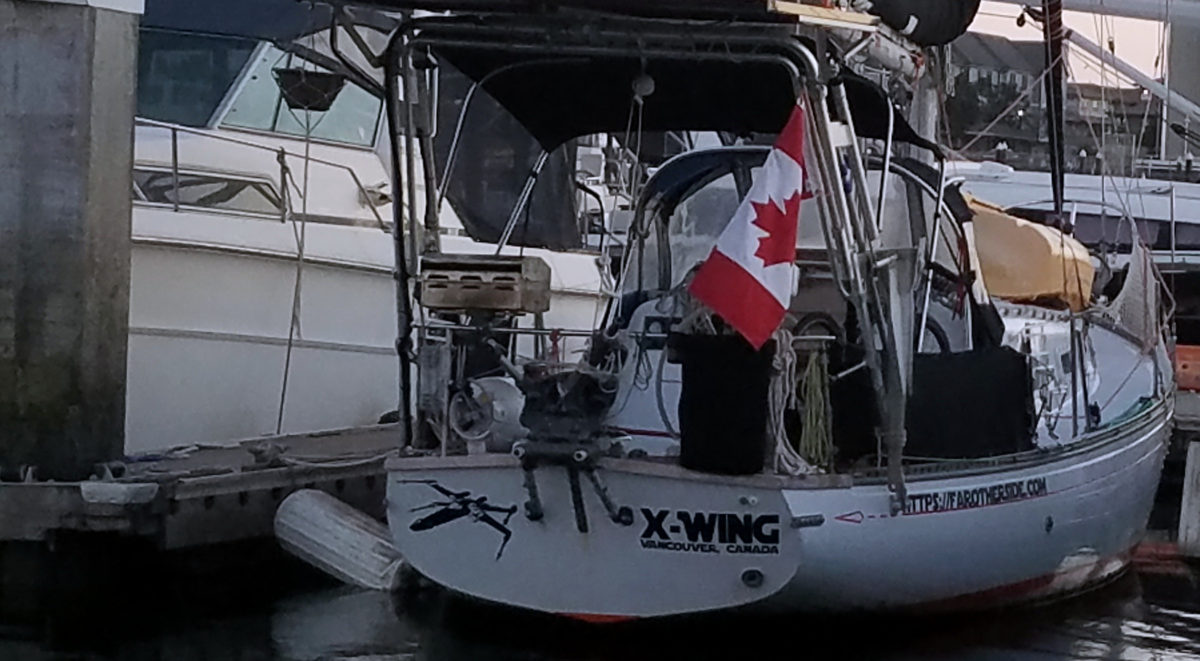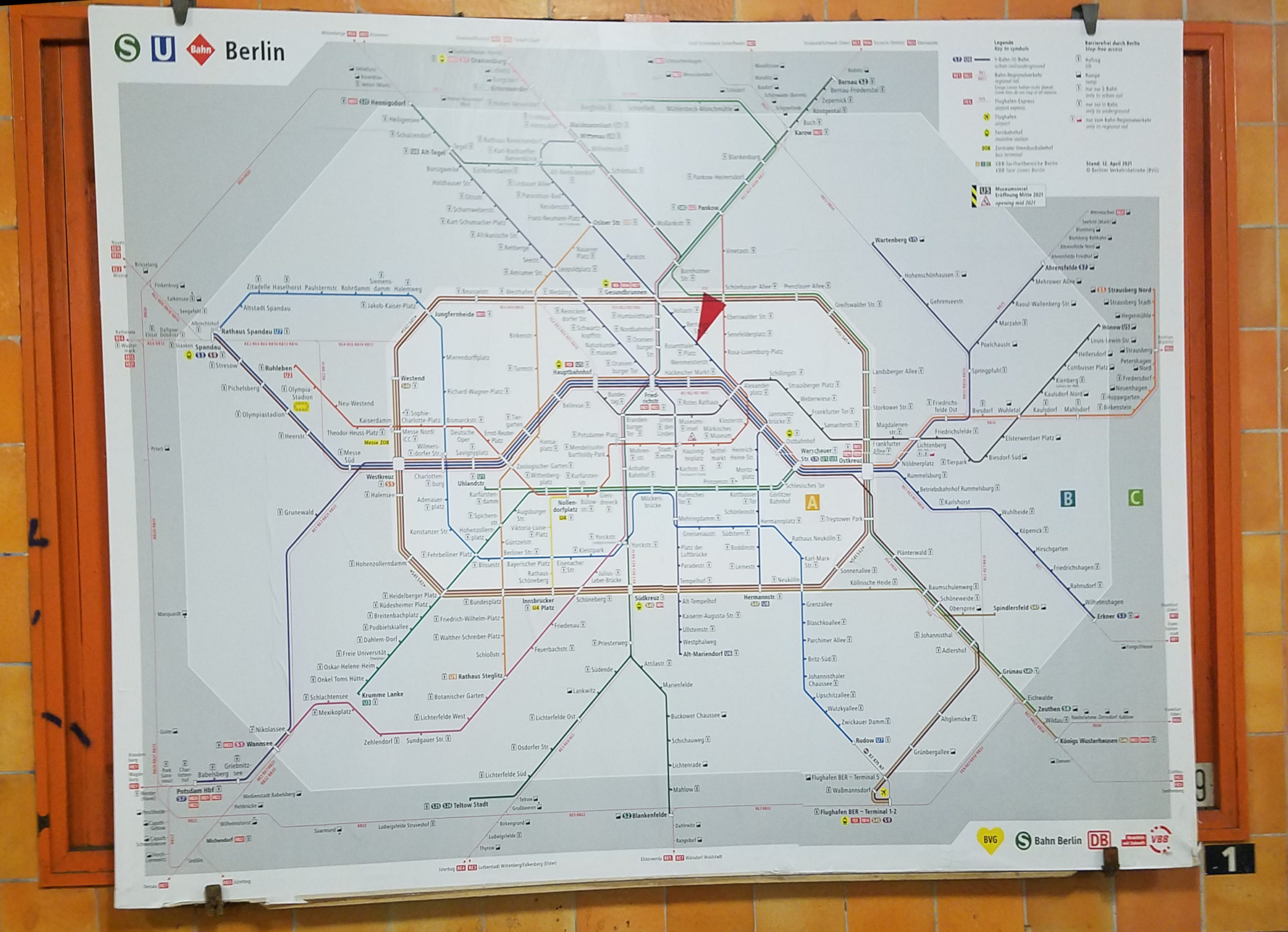Volcano Bay, 55° 13.6’N 162° 1.4’W, 4-JUL-2022 – It’s dark at night now, the sun rises about 6:00 a.m.: a combination of being 2 weeks past the solstice, and 5°, about 300 nautical miles south of Homer.
We spent the last few days in Sandpoint, a town we skipped on our way west 2 years ago. It has fuel, a supermarket, schools and qualifies as a real town, with a police force and city government. The harbor area looks rundown and depressed.
Jennifer had misgivings.
Sand Point is a working harbor very far from anywhere. How distant it is from anything is evidenced by bananas costing $3.99 a pound.
There is no real place to discard things, and surrounding the harbor are acres of storage for fishing gear and fishing vessels.
After we docked, a man came by the boat and introduced himself as Adam. He had visited with us on the Discovery dock in Dutch Harbor 2 years ago. He recognized Caro Babbo.
Adam sat on the dock for a while and spoke with me. He would be a frequent visitor over the 48 hours we were there.
Immediately in front of us on T dock, which we correctly guessed was for transients, was a large fishing boat and in front of it a French-flagged ketch. The boat was metal, and seemed to be the type of vessel that one wants for high latitude sailing, airy and dry on the inside with lots of light, and heavily built.
We commented that it was the second French-flagged vessel we’d seen so far. As we were walking back to Caro Babbo we saw one of those very typically French aluminum boats that we see up here: cutter rigged, built out of aluminum, with a very high aspect ratio mast. Sure enough, she was French flagged.
We waited on the dock for her to come in, and unusually, the deck hand, who looked as much like an old salt as one could imagine, tossed me a line. Vessels that do a lot of docking on their own generally want no help. We never toss a line to anyone when we come into a dock, because they will often times take the initiative and lock the line down when we don’t want them to. I took the line and walked along with the boat as it moved forward along the dock. I asked if the line should be tied down, and the helmsmen by now was standing at the rail and spoke very good English, said that I should tie it down.
A few minutes later we would untie the boat and move it forward to where we hoped, in vain, there was power.
It gets a little confused, either after we tied down the new aluminum boat crewed by Laurent and Bernard, or in the interim after seeing the French boat on the dock, the skipper of the fishing boat Katrina M out of Homer came by to say hello. Chuck is gregarius friendly and sincere. Probably early 50s, been fishing forever.
Chuck offered us use of his shower, TV room if we wanted it and a place to watch videos. On the one hand, it would be difficult to imagine sailors from a sail boat coming on to a fishing boat to hang out watching videos etc, and impossible to imagine sailors on a small sail boat not taking up the opportunity to have a hot shower, which is what we did.
In that short time, couple hours of docking, we met so many people. Chuck’s crew were two men in their 20s, and Jeff in his middle fifties.
Jeff is very well spoken, and talks enough to put one a little on guard as to whether something is not quite right. But everything is right. Jeff is quiet spoken, tremendously interesting, and after talking for a few minutes on his own, begins to ask questions and engages in an easy conversation.
Jeff and Adam would each stop by the boat several times during our stay.
Getting to the fuel dock, which was not designed for small vessels was difficult, so we decided to use the fuel in our jerry cans to refill our tank and then use a cart from the marina to walk those cans over to the gas station, which was run by LFS, a company that runs stores oriented to fishing boats.
Though the fuel pumps are standard gas station pumps, you must pay inside where the clerk asks what the fuel will be used for and adds taxes appropriately. There are constant reminders that we are not in the lower 48.
The image of fishermen in the media is so at odds with the people we meet. They’re are always nicer and more sincere than most people we meet. They are generally will educated and, of course, smart independent business people using technology and working the constantly changing regulations and prices that effect their ability to make money.
While we were waiting for a cart to free up, a man standing next to his pickup truck started a conversation with us. He and Jennifer spoke mostly about the region, the industry and his family history. He mentioned his grandmother, which started he and Jennifer discussing a book based on a local newspaper. He had every issue of that paper.
As he and I spoke, we each had light bulb moment. We had met two years earlier in the harbormaster office in King Cove.
It does feel like coming home.
Edgar talked to us about people we knew in common as had Adam and Jeff.
We also talked about Sand Point. Like Port Charlotte in Haida Gwaii, Sand Point was formed by smaller villages failing: the people would move to the next town. Edgar’s people came from Unga, Jennifer’s favorite island where we anchored one day two years ago and walked the deserted falling down town.
Edgar commented that everyone just walked away leaving everything in their houses as if they would return from work.
The houses, the school and all the buildings just fell in on themselves.
On July third, Jennifer and I left the dock, shortly after the two French boats, to come here to Volcano Bay, one of a number so named.
Of the two volcanoes here, Pavlov and Pavlov’s sister, Pavlov is smoking from two vents. Neither Jennifer nor I have ever seen a smoking volcano.
The people we meet tell us the sailboats are back after COVID, but the numbers are small enough that they can recite the name of every vessel.
We shared our Volcano Bay anchorage with a 75-foot charter vessel and a fishing boat. Like most of the anchorages this year, the winds funneled down the slopes, raising no waves, but testing the anchor.
We are safe, meeting people we know and making new friends.
Jennifer and I are in King Cove as I write this. James the harbormaster remembers us. We discuss his college-age children.
More from our next stop before we make another overnighter.
Find our location at Carobabbo.com along with our blog posts

